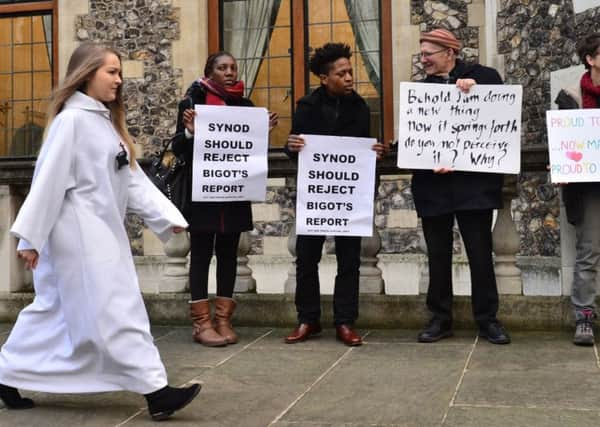Church of England General Synod rejects report on homosexuality


The report by the House of Bishops, which was presented to the Synod on Wednesday, called for the Church to adopt a “fresh tone and culture of welcome and support” for gay people - but not to change its opposition to same-sex marriage.
The recommendations were the subject of a “take note” debate on Wednesday afternoon as more than 400 Church leaders gathered for the third day of the Synod at Church Hall in Westminster.
Advertisement
Hide AdAdvertisement
Hide AdThis means the vote is not a formal rejection of the proposals, but will be used to inform future work by the House of Bishops.
There were 242 votes in favour of “taking note” of the report, 184 against - including one bishop - and six abstentions.
But for the report to be symbolically approved, it had to gain a majority in the House of Bishops, House of Clergy and House of Laity.
Some 93 members of the House of Clergy voted in favour, 100 voted against and two abstained.
Advertisement
Hide AdAdvertisement
Hide AdThe Archbishop of Canterbury had urged the Synod to approve the report ahead of the vote, adding the Church needed a “radical new Christian inclusion”.
He said: “I believe passionately that the report worked on, struggled on, not carelessly, not thoughtlessly, gives a basis for moving on. A good basis, a road map.”
The report had recommended the Church of England should continue to consider marriage as “a union, permanent and lifelong, of one man with one woman”.
The Bishop of Norwich, Graham James, said there had been “very little appetite” for changing the doctrine, as he introduced the debate to the Synod.
Advertisement
Hide AdAdvertisement
Hide AdHe said: “We face a real challenge here since our failure to amend our doctrine of marriage to include same-sex partners can be heard as discriminatory and perceived as undermining our attempt to proclaim the core message of Jesus, that we should love our neighbours as ourselves.”
He added that there is “no simple and easy answer” to this issue and said views held were “profoundly contested”.
The debate, considered the focal point of this week’s Synod, prompted impassioned speeches from members.
Lucy Gorman, an activist and representative from York, said as a member of the church in her 20s she was part of a “dying breed”.
Advertisement
Hide AdAdvertisement
Hide Ad“Trust me, outside of these walls we have been heard as lacking in love,” she said.
“Most people have a friend or family member who sits somewhere on the gender sexuality spectrum - and why would they become part of an organisation which is seemingly homophobic, even if we don’t intend it.”
In an emotional plea for the Synod not to take note of the report, Ms Gorman said: “I’m a dying breed because my friends are dying over this.”
She referred to the words of her friend, Helen, who took her life in April last year.
Advertisement
Hide AdAdvertisement
Hide AdMs Gorman said: “She said to me, ‘I love my local church and my faith but I feel conflicted about the Church of England.
“’It makes me sad and angry that it can waste so much energy in being inward-looking, that it misrepresents God’s generous love, Christ’s teachings and as an established Church can be exempt from equality legislation’.”
Ms Gorman concluded: “I’m not asking for same-sex marriage in churches, a girl can but dream, but I plead with you not to take not of this report because we can and we need to be better.”
Jay Greene, from Winchester, who is in a civil partnership, said congregation members want the Church to go “further, faster, forward”.
Advertisement
Hide AdAdvertisement
Hide AdShe said many knew gay people who wanted to have their partnerships celebrated by the Church and they were “deeply disappointed by this report” and its “tone of fear”.
“They want you to find an accommodation as you did over the remarriage of divorcees, and over women priests,” she said.
The House of Bishops’ report had urged the promotion of “maximum freedom” with current laws and doctrines, without changing them.
The Bishop of Norwich said pursuing legislation authorising the blessing of such marriages would be “so contested as to fail and deepen division”.
Advertisement
Hide AdAdvertisement
Hide AdBut the report said it was possible for clergy to hold prayers with and guide same-sex couples.
Speaking after the result, Mr James said the bishops had come to the debate “committed to listen”.
He said: “Our report did not bring proposals, it brought a framework and a request for Synod to tell us what they thought.
“We have listened to those who have spoken, and those others who have made contributions to us directly.
Advertisement
Hide AdAdvertisement
Hide Ad“Our ongoing discussions will be informed by what members of Synod and the wider church have said as a result of this report.”
The Bishop of Willesden, the Right Reverend Pete Broadbent said: “In this debate, we haven’t even begun to find a place where we can coalesce.
“The Bishops’ Report acknowledges a place of starting.
“More conversation is needed. We don’t yet know the next stage - nor yet when and whether we can bring any further report to Synod.”
Equalities campaigner Peter Tatchell said: “This vote to, in effect, reject the Bishops’ report is a victory for love and equality.
“It is the biggest defeat for the Anglican leadership in many decades.
“Synod refused to endorse the anti-LGBT exclusion and discrimination enshrined in the bishops’ recommendations.”